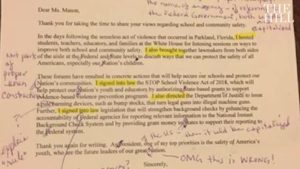
The White House letter with English teacher edits.
A retired high school English teacher says a letter she received from President Trump would have barely earned passing marks, so she corrected the letter and sent it back to the White House.
Yvonne Mason, an Atlanta resident who retired last year after teaching middle and high school students in South Carolina for 17 years, corrected grammatical mistakes in the letter bearing Trump’s signature, including 11 instances of improper capitalization of words like “president” and “state.”
“If it had been written in middle school, I’d give it a C or C-plus,” Mason told South Carolina’s Greenville News. “If it had been written in high school, I’d give it a D.”
She did not attach a letter grade to the letter she sent back to the White House.
Mason acknowledges the letter was likely written by a staffer. She received it after penning a letter requesting that Trump meet individually with the families who lost loved ones in the Feb. 14 high school shooting in Parkland, Fla.











Having taught ethics, among other subjects (in addition to English), I feel confident in supporting the marks and remarks of Ms. Mason and in going a step further: the ethical problems in Trump’s letter and general ethical behavior.
Although Ms. Mason is correct in pointing out capitalization errors in the President’s letter, I will give him a mulligan here because The President of the United States of America should have certain rights in using the English language in order to express himself and, in doing so, disclose the general will of the citizens he serves. Therefore, as often in his Twitter pieces, President Trump transgresses the normalcy of standard English by emphasizing certain words through capitalizing them, a usage that may go back to his German roots. While this habit still opens itself to the charge of treating some nouns as more equal than others, I sense that he is actually making a point here. In fact, some nouns (evidently, “nation,” “federal,” and “president” among them), are able on occasion to comprise a linguistic elite, just as certain individuals in the President’s world do so. “All men are created equal” only has to be true in one sense: before the law. “All men are created unequal” can be true in all the others. Ms. Mason herself seems to consent to an occasional loosening of strict rules of English with her “y’all” [sic].
However, it is regarding another point Ms. Mason makes about the President’s letter that I must not only support her but go farther. This is where she takes issue with the words “I signed into law legislation….” The problematic construction is not only vulnerable to the charge of redundancy but, as the veteran retired educator questions, raises the concept of agency, and this is where ethics comes upon the scene of the missive. Can, in fact, the head of the executive branch make law? Doesn’t the President risk the accusation of infringing upon the constitutional separation of powers with his sentence? And by using the word “legislation,” doesn’t he subtextually acknowledge the existence of a legislative branch of government, the authority of which he is directed to uphold? Mason’s query, “specific agency?” rightly targets this very confusion.
Further, the concept of agency raises all sorts of conundra that spill over into ethical as well as political spheres. Where does the President’s agency end? For that matter, where does it begin? Certainly, there must be a personal core from which all subsequent decision-making and behavior flows; otherwise, how could anyone be held legally responsible for his words and deeds? Yes, the law makes allowances for the mentally impaired but, to imply that such qualifications apply to our Commander-in-Chief approximates blasphemy. To say that Donald J. Trump possesses a personal core is a ridiculous tautology; as our prime leader, he is the very model of what an American citizen should be.
But what about where the President’s agency ends? Surely, he himself (now that we have at least partially settled on his having a self) does not claim a “L’etat, c’est moi” kind of public expansiveness for his Self, as that would be a treasonous betrayal of his oath of office! Where, then, does Donald J. Trump end? Is there, in fact, no end to the man, public or private, who we refer to with the aforesaid appellation? Quid est quis? And what are the repercussions, ethical and political, for the blurred boundary between the realms of Trump and not-Trump? These are the questions I would humbly like to add to Ms. Mason’s trenchant critique.
Perhaps Trump should build a wall around himself and, when he does so, do it IN CAPITAL LETTERS!
Honestly,
Richard Tres